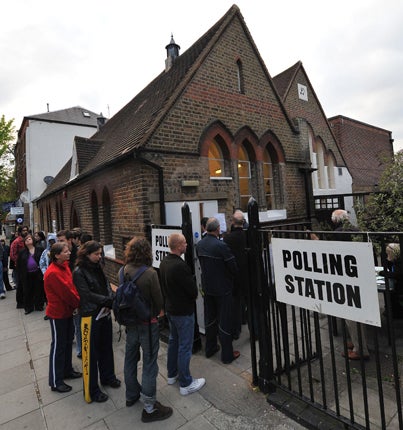Armando Iannucci: Fear and loathing have mixed with a yearning optimism
Weekending

In a couple of weeks' time I'm delivering a talk in Oxford entitled "Do we get the politics we deserve?" I haven't written a word of it yet because I've no idea what politics we've got, let alone whether we deserve them.
That's the baffling thing about this week. No one has anything to compare it by, and people generally don't know whether to be delighted or appalled. How would you have felt if Blue Peter had teamed up with Magpie or Take That had merged with McFly or the cast of Life on Mars had woken up from a coma to find themselves in Ashes to Ashes? It was that weird. Faced with all this, I suppose the collective public attitude now is "Blimey... er... I'll get back to you." Indeed, most people's reaction is probably a new emotion they never thought they had. It's a positive cynicism, an optimistic worry, a sort of yearning for it all to work combined with an unsettling feeling that comes from wishing people well whom you never voted for and possibly hated with every fibre of your being. In short, it's a coalition of emotions.
The dynamics of the week didn't help. Everything happening was announced as "extraordinary", so much so that I fully expected a strapline across the screen saying "Utterly Live Breaking Phenomena". In fact, nothing was happening, at least not in front of the cameras, since most important conversations were taking place quietly in Whitehall and no one was leaking a damn drop. This meant the airwaves filled with rumours of deals and great concessions. I was sure at one point we were going to hear that Cameron had betrothed his daughter to Clegg's middle son and a ceremony was going to take place the next day in St George's Chapel at noon. In an event vacuum, speculation is prince of the airwaves. Great questions were being asked on what sort of compromises were being hammered out. Was Clegg agreeing to be only partially friendly towards Europe? Was Cameron downgrading his manifesto to The Medium Society?
When the two leaders eventually took office, the whole sequence of events seemed so (yes I'll say it) extraordinary that even now it's difficult to pin down one's reaction, other than to think that their joint press conference in the Downing Street Rose Garden did make them look a little bit like Ant and Dec. Which is possibly appropriate, since we had just been watching five days of "I'm Gordon Brown, Get Me Out of Here."
I think this melée of emotions is possibly a good thing, if only because it puts on hold our natural rush to pull apart anything we don't immediately like. I feel this pressure particularly keenly, belonging as I do to that metropolitan faction who earn a living laughing at others' misbehaviour and misfortune. Since, in the past, governments have been elected on the votes of a smaller and smaller proportion of the electorate, it's fair to surmise that most people have tended to be unhappy with the result.
This time round, we have a government that officially accounts for 59 per cent of those who voted, so you'd assume most people would be happy. But they don't seem to be. If you scanned the press, media and blogosphere, you'll mostly get predictions of tensions, rivalry, confusion and eventual collapse. And in any public forum, discontent is aired. The people who voted Liberal Democrat to get Labour are furious, as are quite a lot of the people who voted Conservative to get Conservative. And the people who voted Liberal Democrat to get Clegg are baffled as to how much of him they actually have or whether they even want him now.
A lot of this is our natural suspicion of anything new, especially if it's something no one specifically asked for. A coalition takes us into territory we've never had to deal with before, a set of circumstances, compromises, reined-in emotions, downplayed differences to which our first response is stuttering and incoherent. We haven't yet formulated the appropriate grammar.
I get frustrated when Liberal Democrat voters shout that they never voted for Cameron. No, they didn't. But they knew there'd most probably be a hung parliament. What on earth were they expecting? A coalition with Esther Rantzen? Some would argue they were doing it expecting a pact with Labour, but alas, democracy doesn't yet provide us with a system where we can vote for one party while influencing how many people vote for another.
Those Tories and Liberal Democrats who complain that their parties have watered down their proposals don't understand the definition of compromise. You cannot compromise while remaining absolute. No number divided by two is itself. And any Labour voter who complains that the Liberal Democrats have let in the Tories is ignoring the fact that, without them, the Conservatives would have a powerful majority. Seventy per cent of something you don't like is still awful, but it's better than 100 per cent.
This situation could be catastrophic or constructive, revolutionary or repugnant. We just don't know at this stage, which is why I'm bating my breath, putting the safety catch back on the revolver, and waiting to see what happens next. It is 100 per cent interesting though.
Join our commenting forum
Join thought-provoking conversations, follow other Independent readers and see their replies
Comments
Bookmark popover
Removed from bookmarks